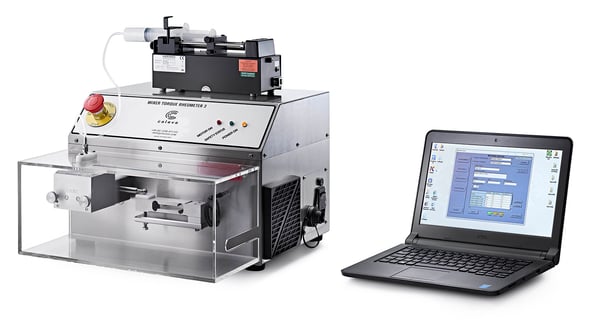The Mixer Torque Rheometer (MTR) is a unique and valuable research, and formulation development tool for tabletting, extrusion, and spheronization outcomes.
It can also be used as a production line instrument to monitor wet granulation quality and consistency, helping to maintain, and even increase, useable yield.
The MTR provides reliable and reproducible results at any scale.

Designed to measure and characterise wet granulation properties, the Mixer Torque Rheometer (MTR) is the ideal instrument for pharmaceutical formulation development (for tabletting, extrusion, and spheronization), or any application using wet granulations.
The MTR provides in-depth and precise quantitative data about your wet granulation by measuring the torque of the wet granulation during the mixing process.
The resulting data helps to accelerate and enhance your research, development and production projects.
Suitable for use in pharmaceutical applications, but also in a wide range of other industries and settings, including food, chemical, nutraceuticals, and many more. The Mixer Torque Rheometer enables you to quickly optimise your formulations by removing the guesswork and providing quantitative data about your wet mass.
Skip the lengthy trial and error stage of establishing liquid to solid ratios and optimal mix time. A vital companion for speeding up formulation development for tablets - especially when the active pharmaceutical ingredient (API) is expensive or in short supply.
Replace the subjective 'hand squeeze test' and quickly identify the optimal amount of liquid binder to powder ratio, and mix time needed to achieve successful extrusion and spheronization on your first attempt.
Ensure a seamless transition from laboratory-scale experiments up to pilot, batch or continuous production.
Importantly for scale-up, the MTR provides data that standardises different types of mixers, eliminating concerns about discrepancies between lab mixers, such as high-shear, and production mixers, like planetary mixers.
Manufacturers can use the MTR to establish and maintain rigorous quality control standards, leading to enhanced product quality and useable yield.
The MTR can help to identify the most time-efficient mixer for your specific needs. In circumstances where time is money, the MTR can guide you to the optimal mixer type for you wet granulation, to achieve the torque target in the shortest time.
Researchers and manufacturers can use the detailed insights provided by the MTR to optimise their powder formulations, leading to improved process efficiencies and a deeper understanding of powder behaviour during processing, to achieve high-quality products.
Read our article Opportunities for Mixer Torque Rheometry to understand more about the many benefits and applications for the Mixer Torque Rheometer within formulation development and production.
Discover how the Mixer Torque Rheometer can benefit your project during a free no obligation online demo with one of our equipment specialists.
We express our sincere appreciation to Caleva for providing us with the essential Mixer Torque Rheometer (MTR), a critical component in our wet granulation formulation studies at Nobel İlaç. The support and equipment supplied by Caleva have been instrumental in our research endeavors. We appreciate the opportunities this technology has presented, allowing us to conduct in-depth analyses of our formulations for tablets, extrudate, and pellets. We excite about the prospects of advancing our research with the MTR. Thank you for your support and we are eager to further explore the possibilities ahead.
Sinem Yetim Pharmaceutical R&D Specialist and Mentor at Nobel, Türkiye
I am particularly keen on how the MTR can enhance reproducibility among formulations. As with all research work, this is crucial for validating. This can be helpful for making many samples from mixing diverse materials easily while still simultaneously analysing some pre-formulation parameters.
Dr Francis Brako Lecturer in Chemistry and Drug Delivery at the Medway School of Pharmacy
Please call us without obligation.
+44 (0) 1258 471122Please call us without obligation.
+44 (0) 1258 471122